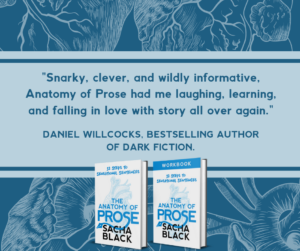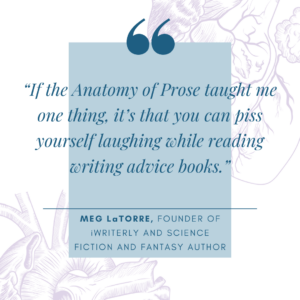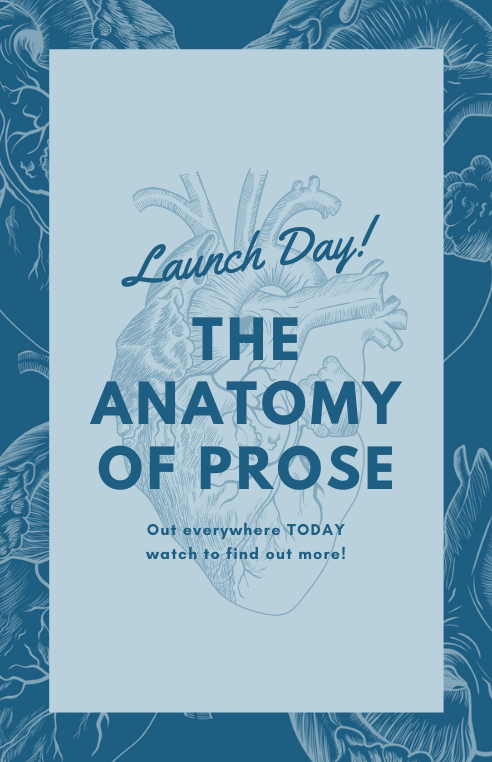To celebrate the launch of The Anatomy of Prose: 12 Steps to Sensational Sentences Textbook and The Anatomy of Prose: 12 Steps to Sensational Sentences Workbook, I thought I’d do something a little different. Today’s post is a triple whammy. You can read it below, watch it on my YouTube Channel or listen to it on my podcast. And just what is today’s post all about? Improving your sentence level prose, of course! So here are 10 tips to improve your prose.
N.B. If you’re a listener to the podcast, and want to hear the usual intro and updates, please listen to the audio version beneath the video. If you want to watch the meat of the show (i.e. just the tips) you can watch the YouTube episode below.
N.B. The episode show notes are at the bottom of the post.
Get your copy of The Anatomy of Prose
Get your copy of The Anatomy of Prose Workbook
Tips to Improve Your Prose 1: Don’t filter
Filtering is one of the most common mistakes I see in manuscripts when I edit. You want your reader to look directly through your protagonist’s eyes. Like the reader’s wearing hero tinted spectacles. But when you filter, you, the author, add in unnecessary narration.
This causes the reader to be removed one step from the character. So instead of watching through the protagonist’s eyes, the reader is standing to the side watching the hero do things.
Filter words include things like:
- I heard
- she saw
- he felt
- I thought
Here’s an example:
With Filtering:
I heard an owl hooting in the trees and a moment later I saw the canopy leaves rustle as if replying.
Readers don’t need to read the word “heard” or “saw” because the action of hearing and seeing is implied in the description of the sound.
So what does it look like without filtering?
Without Filtering:
An owl hooted in the trees and a moment later the canopy leaves rustled as if replying.
Of course, there are no rules. You don’t have to remove every instance of filtering. That’s especially if removing it will impact the meaning of your sentence.

Tips to Improve Your Prose 2: Repetition
Repetition is an insidious little bitch. Everyone thinks repetition comes in the form of crutch words. But NO, my darlings. It’s so much more than that.
Let’s start with crutch words. Crutch words are words or phrases you unintentionally repeat in your manuscript. For example, just, but, so, that, look, hand, eye, glance, walk.
But what about the other, more subtle forms of repetition?
Different Words, Same Meaning
Writers will often unintentionally use different words to describe the same thing. For example, describing cold temperatures multiple times with words like: chill, icy, cool etc.
Describe it once, describe it well. Move the fuck on.
Same Words, Different Meaning
The flip side of that repetition is using the same word in a different context. For example, the hum of a bee or the hum of a car’s engine.
Guys. We’re writers, the thesaurus is your best friend. Use it.
Duplicated Archetypes
During one of your edits, make sure you check for duplicated character types. For example, do you have two mentors? Are there an unnecessary number of allies? Of course, sometimes these duplications are needed. But more often than not, you can condense the duplicated characters into one more effective and efficient character that readers can get to know better.
Better to have one supercharged steroid injected mentor than three pitiful ones because they don’t get enough page time to have any depth.
Duplicated Personality Traits
Likewise, look for repetition in personality type. Have you got two sarcastic divas? Or two brooding gentlemen? Two mother’s of villains? NO, NO YOU DO NOT. I am the only mother of villains.
The point is, do you really need two of this personality trait? Or would it be more effective to have one?
Name, Name, Name
We all have biases. Which is why you should always check your character names. If you’re not careful, you’ll end up with two characters with similar sounding names or names all beginning with the same letter.
If you have Natalie and Nancy or Tony and Tom, your readers are going to get confused.
Opening and Closing of Scenes
Check the opening (and closing) lines of your scenes. If you have four scenes back to back all opening with a location description, or all starting with dialogue, or all starting with inner monologue, you need to edit out the repetition.
Tips to Improve Your Prose 3: Don’t forget the Impact
Whenever a writer describes something, be it a new character, the atmosphere or a new location your character has walked into, most writers describe the obvious — what their protagonist sees. While the ‘what’ of what a protagonist interacts with is important for creating imagery, it doesn’t create the connection that hooks a reader through the rest of your story.
What makes a reader connect is the emotion in the story. But how can you convey emotion when the protagonist is describing a building, meeting a new character, or buying a coffee? The quickest way to create emotion even in these interactions is to describe the impact the interaction has on your protagonist.
Does the smell of coffee throw your protagonist back to a childhood memory? Does the smell make them feel sick?
WHY PEOPLE, WHY???? THE READER NEEDS TO KNOW.
Is that smell or memory painful or comforting? What about the way shadows fall over the building your protagonist’s about to walk in? Do they make her stomach churn or does she feel like she’s coming home? Rather than describing the colour or shape of a building, give the reader insights into the emotional impact it has on your characters.
This goes for describing characters too.
How does the new character make your protagonist feel? The impact says a thousand times more than the colour of the character’s eyes.

Tips to Improve Your Prose 4: Don’t Forget the Senses
While sight is the basis for description in most stories, too often, we writers forget to include the other senses. Or, when we do use them, they’re used in isolation or used in their expected form, i.e. the scent of toast wafts through the door.
I like to compare using the senses to creating a painting. A pencil sketch outline of your painting is a normal sentence without the senses. Nothing wrong with that shit, I adore pencil pictures.
But when you pour the senses into your prose, it’s like turning a pencil drawing into a mixed-media full color piece of art. It breathes life into your masterpiece.
BUT HOW DO YOU USE THEM?
With the senses, think outside the box rather than using them in their most obvious guise. For example, touch includes temperature and vibrations as well as texture. Consider describing things like buildings, the weather and air, the ground, skin, weapons, clothes, nature and even emotions. You might not think of emotions as having a texture, but they do! Think about the hot, throb of rage, or the cold, prickle of fear.
Likewise with taste, how often have you tasted rage or perhaps the tang of jealousy? Or what about tasting the weather? I’m sure you can all imagine the cold crisp breath of wintery air.
Tips to Improve Your Prose 4: Drop the Standard Character Descriptions
When introducing characters to your story, most writers describe their brown hair or blue eyes. But think about it. When you finish a book do you remember the colour of a character’s hair? Or do you remember what they stood for? Their strange quirks and how they made you feel?
I thought so.
There’s a few tricks you can use to ensure your characters stand out to your reader and describing their eye colour ain’t one of them.
While, YES, you do need to describe their physical appearance, what makes a character more memorable are their quirky features. Take Sherlock Holmes, does anyone even know what colour his eyes are? Didn’t think so.
And if you’re the smart arse shouting they’re brown at the screen, shut the fuck up, and get back in your box.
What we remember about sherlock is that he’s a pipe smoking genius. Or maybe his suspicious fashion choices, Deerstalker hat anyone?
For each of your characters, create your normal physical description, but make sure you add one or two quirks. In Sherlock’s example, he has: a pipe, Deerstalker hats, tweed, and a magnifying glass.
Instead of focusing on the normal details, mention those in passing and have your protagonist notice the unusual quirks your new character has. It makes them much more memorable.
Tips to Improve Your Prose 6: Anchor that Shit
A lack of scene anchoring is one of the fastest ways to disengage a reader.
But what is it?
Scene anchoring is the process of grounding a reader in time, space and point of view.
Every time you open a new scene or new chapter, your reader needs to know three things in order to not feel like they’ve been thrown around a washing machine having consumed a socially unacceptable amount of gin.
Number 1: WHO is telling the story. If you write stories from multiple POVs thats even more important. If you write in first person, give yourself a pat on the back, you get to feel like a smug bastard.
Number 2: WHERE are they? Are they in space? Are they amoebas stuck on the ass cheek of a cricket? Or are they in a fantasy castle?
This is even more important if your characters have moved between scenes. Your reader might’ve put your book down at the end of the last scene break. If so, they’re gonna need a refresher.
Number 3: WHEN are they? Has time passed since the last scene? Don’t expect your readers to know. They aren’t mind readers. Be clear. Tell them if time has passed.
Tips to Improve Your Prose 7: Always Strengthen Your Verbs
Here’s the thing. Weak verbs are vague. Vague means your reader doesn’t really know what the fuck you’re trying to say. Don’t do that to your reader. It’s rude. But what’s a weak verb?
Hit. That’s a weak verb.
What the hell is a hit anyway? Is it a gentle tap? Is it a flirtatious nudge in the ribs? Is it a violent clobbering to the head?
TELL ME AUTHORS. WHAT IS IT?
Be specific.
Is it a nudge? Nudges are softer they don’t hurt. Which means, nudge is a stronger verb. The action of nudging is specific. If it’s a punch, that’s also specific. You can’t punch someone by accident. If you punch someone in the dick, it’s going to fucking hurt.
Use strong verbs.

Tips to Improve Your Prose 8: Unusual Details
One fast way to create deeper characterisation, is to ensure your protagonist notices unusual details. Details no other character would. And these details should be connected to their personality type too.
If, for example, you have a character who’s super empathetic, then they ought to notice subtle body language changes in other characters. This not only deepens your protagonist’s character. It deepens the character they’re looking out for too.
Got a protagonist with an eye for patterns? Then they should spot patterns throughout the story. AND especially a clue or pattern that leads to the magical sword of destiny that saves the day.
Let your protagonist notice unusual details when describing people, places, events. It’s the nuances in their noticings (that’s probably a word) that reveals their personality.
Where one character notices the sadness in another’s eye. Another protagonist might notice that they’re not carrying a blade they usually do.
DETAILS, PEOPLE. THE DETAILS MATTER.
Tips to Improve Your Prose 9: Differentiate the Dialogue
Ever worried that all your characters sound the same? It’s cause you haven’t differentiated the dialogue. BUT HOW, SACHA? HOW DO YOU DO IT?
A stack of ways. Here’s some ideas.
Think about your character’s personality type and let that influence the way they speak. Got yourself a stuff professor? Have them use long stuffy words like:
- Furthermore
- In addition
- The definitive conclusion
Got a gang member? Make sure they’re using slang or gang-specific words. Got yourself a diva? Make sure they’re sarcastic and throwing verbal takedowns like it’s candy on halloween. It’s all about your characters personality. When you know what that is, it becomes their voice.
Tips to Improve Your Prose 9: Avoid Exposition
Exposition is a crude tool. Essentially, exposition occurs when you the author explain something to the reader. Ever heard of mansplaining?
This is authorsplaining.
SURE, sometimes we need to tell because otherwise our manuscripts would be 4687 pages long. No matter how good your writing, a reader doesn’t want a book that long.
So when can you “expose”? Stop thinking about breasts. I don’t mean exposing yourselves. Heathens.
How can you tell you’ve exposed your inner story secrets? The two easiest ways are looking for long dense paragraphs of text or finding those paragraphs that take the reader out of the “present action”.
If for example, you’re in a space ship racing towards a fight and suddenly you’re talking about the laws around alien government, then you’re taking the reader out of the present action to talk about something else. You’re authorsplaining. STOP THAT SHIT.
So when is exposition or telling allowed?
- Action scenes
- Where there’s a need for pace
- Shifting scenes
- Younger protagonists
- When it’s in character
- Reader attention
- Complex worldbuilding
- Avoiding narrative repetition
THAT’S IT. ten quick tips to help you polish up your prose. If you enjoyed these tips, then make sure you go grab yourself a copy of The Anatomy of Prose: 12 Steps to Sensational Sentences because there’s a whole lotta other tips in that. You can get it in your favorite book store or you can order a copy through your local library.
Get your copy of The Anatomy of Prose
Get your copy of The Anatomy of Prose Workbook
Rebel Author Podcast Episode 33 Show Notes
This week’s questions is:
What is your favorite literary device?
Book recommendation this week The Anatomy of Prose: 12 Steps to Sensational Sentences you can get it in ebook, paperback or hardback now.
Click the link here.
Preorder the Workbook here.
Join the Launch Party tonight, 29th May 9pm BST, 1pm PST, 4pm EST, 6am Sydney, in my Facebook group here.
Listen to the Next Level Author episode I mentioned here:
Watch onYouTube
Listen on your Podcatcher
Listener Rebel of the Week is Russell Phillips
If you’d like to be a Rebel of the week please do send in your story, it can be any kind of rebellion. You can email your rebel story to rebelauthorpodcast@gmail.com or tweet me @rebelauthorpod
Thank you to new patrons this week Katlyn Duncan, Samurai Girl and Daniel Willcocks. If you’d like to support the show, and get access to all the bonus essays, posts and content, you can from as little as $2 a month by visiting: www.patreon.com/sachablack


💜💜💜